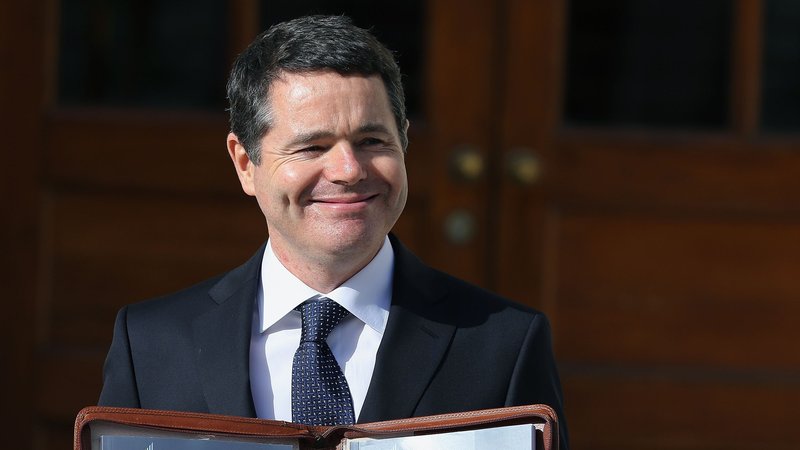Finance Minister Paschal Donohoe announced the budget earlier today. The government is cutting tax and increasing spending next year. Donohoe has declared an 800 million fiscal space, plus revenue raising measures of 700 million. Total extra spend in this budget of 1.5 billion Euro.
Budget 2019 at a glance:
Housing
Government allocating a total of €2.3bn to the housing programme for 2019. €1.25bn allocated for the delivery of 10,000 new social homes through a combination of construction, acquisition and leasing.
An extra €121m for the Housing Assistance Payment (HAP)
€60m extra in capital funding for additional emergency accommodation
€30m is being provided for homelessness services.
€100m for Serviced Sites Fund to support local authorities in bringing forward lands for subsidised affordable housing.
Rental Sector
Mortgage interest relief for landlords will rise to 100% from January 1.
Health
An increase of €1.05bn in Health funding for 2019 bringing the health budget to €17bn.
€25 increase in the weekly income threshold for GP Visit cards
50 cent reduction in prescription charges from €2.00 to €1.50 for all medical card holders over the age of 70
€10 reduction in the monthly Drugs Payment Scheme threshold from €134 to €124.
€84m for Mental Health Services.
National Treatment Purchase Fund (NTPF) to get an extra €20m.
€150m more for disability services bringing the total funding to €2bn.
Cigarettes
Pack of 20 cigarettes to increase in price by 50 cent . Now 12.70euro for a pack of fags (popular brands)
Social welfare payments and allowances
In addition to a €5 per week increase in all weekly social welfare payments from next March, the Christmas bonus payment will be fully restored to all social welfare recipients this year.
A new paid parental leave scheme will be introduced in November 2019 to provide two extra weeks’ leave to every parent of a child in their first year. The Government intends to increase this to seven extra weeks by 2020
From March the earnings disregard for the One Parent Family Payment will increase and a maintenance disregard for the Working Family Payment will be introduced.
The Qualified Child Payment of €2.20 per week in respect of under 12s and €5.20 per week in respect of over 12s, as well as a €25 increase in Back to School Clothing and Footwear Allowance rates.
Education
€10.8bn for the Department of Education and Skills, an increase of 6.7%, to allow for almost 1,300 additional posts in schools in 2019. The Government is also increasing the standard capitation rate per pupil by 5%.
950 Special Needs Assistants to be recruited in 2019.
An additional €196m for capital in Education in 2019 to support the creation of up to 18,000 additional permanent school places and 5,000 replacement places and to facilitate the further upgrade of ICT infrastructure in schools and provide €150m for investment in Higher Education, Further Education & Training, and Research.
Tax and USC
Reduction in the third rate of the Universal Social Charge (USC) from 4.75% to 4.5%.
Increase in the entry point to the higher rate of income tax for all earners by €750.
From 1 January hourly minimum wage to increase to €9.80, the second USC rate band will be increased from €19,372 to €19,874.
The weekly threshold for the higher rate of employer’s PRSI will be increased from €376 to €386.
Increase to Home Carer Credit of €300.
For self-employed workers, the Earned Income Credit will be increased by a further €200 to €1,350.
Children
Funding for the child and family agency Tusla to increase by over €30m to just over €786m.
Funding for early learning and childcare will increase by just under €90m to €574m to support the ECCE Pre-School Programme and the ongoing development of the Affordable Childcare Scheme.
The income thresholds for the Affordable Childcare Scheme will increase in net terms, the base income threshold is being raised from €22,700 to €26,000; the maximum income threshold will go from €47,500 to €60,000; and the multiple child deduction will increase from €3,800 to €4,300.
Tune into The Way It Is on Tuesday evening and KCLR Live Wednesday morning for the local expert analysis of Budget 2019.
Business and SMEs
A Future Growth Loan Scheme for SMEs and the agriculture and food sector is being launched providing up to €300m.
Over €110m for Brexit measures across a number of Departments, including funding for essential customs requirements and a range of other targeted measures.
As part of the National Development Plan, a Disruptive Technologies Innovation Fund established, which makes €500m available for co-funded projects involving enterprise and research partners over the period to 2027.
Corporation Tax
12.5% rate remains unchanged.
Anti-Tax Avoidance Directive (ATAD)
New Controlled Foreign Company (CFC) rules will apply for accounting periods beginning on or after 1 January 2019.
Tourism and services sector
Increase in rate of VAT in the tourism sector to 13.5% from January 2019.
Capital Acquisitions Tax
Increase in the tax-free threshold that applies to transfers between parents and their children from €310,000 to €320,000.
Film industry
Film corporation tax credit will be extended beyond the current end date of 2020, until December 2024.
Tax Relief for Start-up Companies
Extending the three-year tax relief for certain start-up companies until the end of 2021.
Work will begin on the regulation of crowdfunding in Ireland.
Publications
Retaining the 9% rate for newspaper publications and reduction in the rate for electronic publications from 23% to 9%.
Betting
Increasing the tax from 1% to 2% with betting duty on the commission to increase from 15% to 25% with effect from January 1.
Climate change
Additional climate related measures include €103.5m for improvements in grant and premium rates for planting forests.
Introduction of the Beef Environmental Efficiency Pilot (BEEP) to further improve the carbon efficiency of beef production.
€70m for the Targeted Agriculture Modernisation Scheme (TAMS).
Additional funding of €70m for the Environment and Waste Management Programme.
Extending VRT relief for hybrid vehicles until end of 2019.
Providing for a 1% surcharge for diesel vehicles to apply across all VRT bands.
To encourage the uptake of gas-propelled commercial vehicles as an alternative to diesel a new accelerated capital allowances scheme for gas-propelled vehicles and refuelling equipment is being introduced.
Agriculture and rural
€60m for Brexit related supports will be provided to improve resilience in the farm sector.
Renewing the existing stock relief measures for a further three years.
Extending income averaging to farms with off-farm trading income.
Providing a three-year extension of the Young Trained Farmer stamp duty relief, which was due to expire at the end of this year.
An additional €53m to fund the first round of projects under the new Rural Regeneration and Development Fund.
Funding for the PEACE programme to support economic and social stability in the Border region due to Brexit.
Crime and Justice
Increase in budget of An Garda Síochána by €60m (3.5%) to allow for recruitment of up to 800 gardaí and to drive reforms in the force.
An additional €60m to Justice to be used to provide additional asylum accommodation, to widen the Magdalene scheme, fund reforms within the Department of Justice and Equality and the Courts Service, address pressures on Criminal Legal Aid and in Prisons and respond to the demands faced by the Office of the Data Protection Commissioner in its EU-wide role.
Global Aid
Overseas aid set to increase by almost €110m.
Sport and Culture
Retaining 9% VAT rate for sporting facilities.
Increased funding for Culture, Heritage and the Gaeltacht to facilitate the planning and implementation of the department’s ten-year Capital Plan.
There will be an increase in support for arts and artists via the Arts Council of Ireland and the Creative Ireland Programme, as well as additional restoration and development works across heritage.
Rainy Day Fund
The Government will establish a Rainy Day fund of €1.5bn. The fund will be supplemented with an annual contribution of €500m starting from next year.
The minister announced some of the “historically high levels of corporation tax” will be set aside for the fund.








